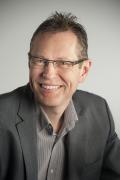
|
If you require an accommodation such as live captioning or interpretation to participate in this event, please contact Kyle McCray, mccray.44@osu.edu. Requests made two weeks before the event will generally allow us to provide seamless access, but the university will make every effort to meet requests made after this date.
Speaker

Alexander Wendt is Ralph D. Mershon Professor of International Security and professor of political science at The Ohio State University. His areas of expertise include the philosophy of social science and social theory, international relations theory, global governance, and international security.
Wendt is interested in philosophical aspects of social science, with special reference to international relations. He is the author of Social Theory of International Politics (Cambridge, 1999), which in 2006 received the International Studies Association award for "Best Book of the Decade" and has been translated into more than 10 languages. In the 2013 TRIP survey of 1,400 International Relations scholars he was named as the most influential scholar in the field over the past 20 years.
Wendt's latest book is Quantum Mind and Social Science: Unifying Physical and Social Ontology (Cambridge University Press, 2015), which proposes a quantum physical basis for consciousness and its place in the natural world, and explores the implications of this perspective for the social sciences. Wendt's argument provides a philosophical basis for human agency through free will, and for a holistic or 'non-local' vision of social life. This book was the basis of Mershon's Quantum Theory and the International conference organized by Wendt in April 2018.
Recent publications also include New Systems Theories of World Politics, edited with Mathias Albert and Lars-Erik Cederman (Macmillan, 2010), based on a conference held at the Mershon Center in 2005. He has also published articles in International Organization, American Political Science Review, Review of International Studies, European Journal of International Relations, International Security, and Politics and Society.
Before coming to Ohio State in 2004, Wendt taught at Yale University, Dartmouth College, and University of Chicago.
Find out more about Wendt on his personal website at http://www.alexanderwendt.org.
Event Host
The Recovering from Violence research cluster is an initiative of the Mershon Center for International Security Studies at The Ohio State University. The cluster seeks to contribute to research and practice geared toward addressing genocide, crimes against humanity, widespread human rights violations, and other forms of collective violence. The cluster engages with conflict stabilization, transitional justice, human rights, development, collective memory, displacement, psychosocial wellbeing, peacebuilding, and reconciliation—guided by the firm belief that the impacts of violence are multigenerational and interconnected. Research is conducted in collaboration with local stakeholders in communities affected by violence and, as such, continually assess research ethics and best practices for decolonizing scholarship.
